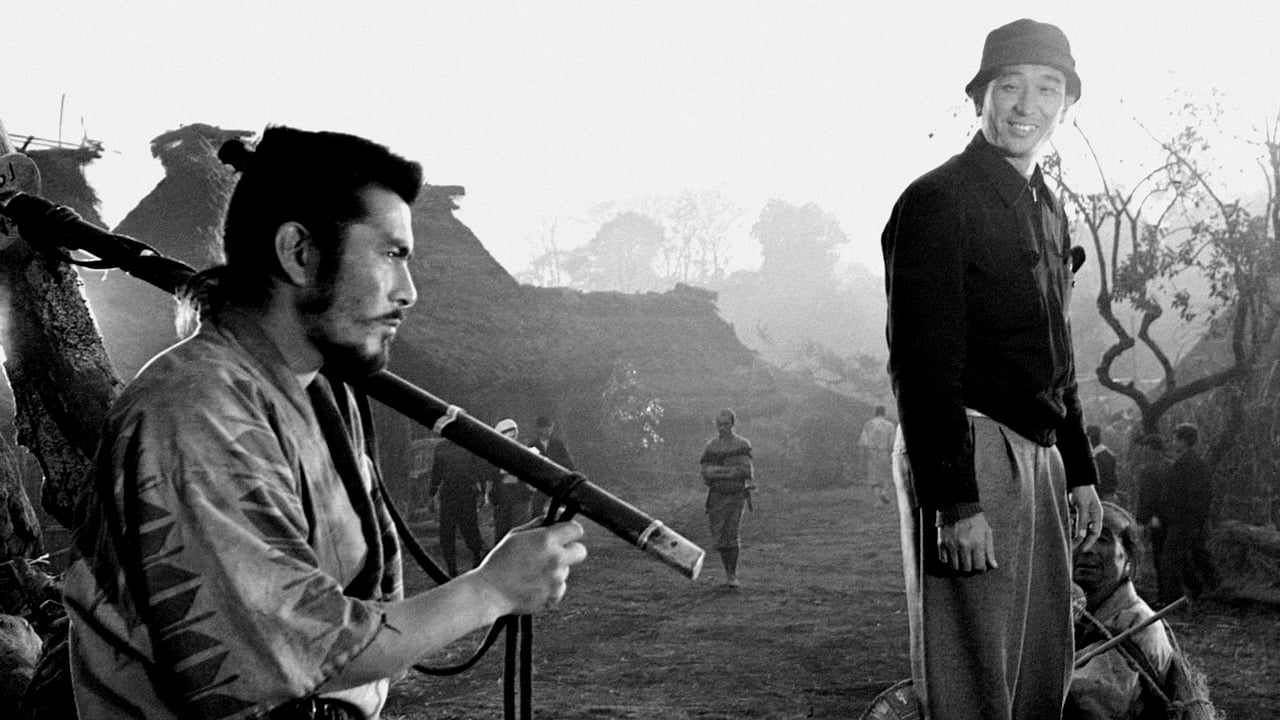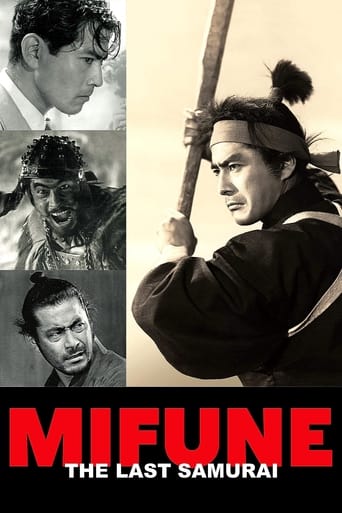GarnettTeenage
The film was still a fun one that will make you laugh and have you leaving the theater feeling like you just stole something valuable and got away with it.
KnotStronger
This is a must-see and one of the best documentaries - and films - of this year.
Hayleigh Joseph
This is ultimately a movie about the very bad things that can happen when we don't address our unease, when we just try to brush it off, whether that's to fit in or to preserve our self-image.
Aleksandar Sarkic
Toshiro Mifune is one of my favorite Japanese actor. He and Akira Kurosawa changed Japanese cinema for all times and also influenced a lot a whole world cinema. When i saw that they are making a documentary about Mifune i was so happy, and finally i had a opportunity to watch it. It is okay documentary but something is missing, it feels somehow empty. I think they put a lot of talking about known movies like Seven Samurai, Yojimbo and Rashomon. It is a shame but they not talk about such great Mifune- Kurosawa collaborations like The Bad Sleep Well and High and Low. Mifune was so great in his roles in drama movies, even better than in samurai ones. Also his private life is not mentioned, okay we only got information he was an avid drinker and loved sport cars and driving, but other things not. Maybe the answer is privacy in Japanese culture, and Mifune himself was very closed person in private life. The guests who are talking about Mifune are generally okay, but were is Tatsuya Nakadai, he acted in so many movies together with Mifune like Sanjuro, Yojimbo, Samurai Rebellion, Sword Of Doom, High And Low, it would be interesting to hear his experiences acting alongside Mifune, also for foreign guests it is okay they have called Spielberg and Scorsese, but where is George Lucas, Lucas was so influenced by Mifune, even he wanted to gave a role of Obi wan Kenobi to Mifune, and Hidden Fortress influenced Star Wars a lot, so i think the director missed some better guests, but on other hand it is nice he called Shiro Mifune to talk about his father that is big plus tome. Generally i enjoyed watching it because i was always interested in Japanese cinema but as i said earlier it can be better. If you are fan of Toshiro Mifune, Kurosawa and old Japanese cinema watch it for sure, you will not regret it.
i-81028
It is a good documentary on an actor that made a big impact in Japan and was important to the export and prominence of Japanese film worldwide, but is slowly being forgotten. With that said, I can only feel that the film had limited budget, research capability and focused only on a small sliver of who and what Toshiro Mifune was. The focus is on Toho and his work in chanbara films with Kurosawa. That is indeed his most important and notable period, but there is not much depth added even in those segments. As interesting as the subject matter is I would still say it is a good documentary where none other exist, but more relevant to those who know little about the actor.
MartinHafer
Steven Okazaki directed this excellent documentary about the famous Japanese actor, Toshirô Mifune and it's narrated by Keanu Reeves. As a lover of Japanese films, seeing this picture was an absolute must and I must point out that many of my favorite Japanese movies starred this incredibly talented man. However, in many ways it's a film less for folks like me, as I've seen almost all the films they discussed in the documentary. Instead, it would be a perfect introduction to his films and would provide you with many great recommendations of pictures you simply have to watch! And, as I already love and respect Mifune, the film didn't do much to change this!I should point out that if you want a more biographical look at the man, this may not completely satisfy you. You do learn about his life but I never exactly felt like I truly knew the man as I watched. Instead, it's much more of a filmography and as such highlighted his very best films and discussed them and their impact… as well as how Mifune was able to make the most in his performances. In fact, when you do learn personal information, it's mostly negative, such as his very heavy drinking and marital infidelity. I would have loved to hear more from his son, Shiro, in order to learn more about who Toshirô really was off camera. Shiro is featured….but I wanted to hear much more. In addition to interviews with the son, you hear from many actors who worked with him as well as from American directors like Spielberg and Scorsese! Wow…you wonder how Okazaki was able to get all this great contributors!Overall, this is a very well crafted film with lots of beautiful film clips, excellent graphics and editing and is really a must-see for anyone interested in international cinema. It's also a must-see for anyone who loves the films of Akira Kurosawa, as many of their best films were collaborations and are discussed in detail in this lovely documentary.
jakob13
We owe a debt of gratitude to Steve Okazaki, an American film maker of Japanese ancestry, for recalling the magnetic Japanese film star Toshiro Mifune, who in collaboration principally but not exclusively with Akira Kurozawa, during 16 years of a frenetic, fecund period of Japanese cinema that left his indelible mark on world cinema. Okazaki cleverly kept his camera on Mifune as samurai, the last samurai, which is slightly misleading. The decline of rerun houses and Japanese film retrospectives may have dimmed the memory of an extraordinary actor. Mifune was an outsider, a fact few know. He was born in China, in Dalian. At 20, he first came to Japan for military service, not welcome but treated as second class. He kept his counsel, cultivated a quiet patience and persevered. In fact, an actor of the Golden Age of Japanese cinema, thought of only one word that defined Mifune: perseverance, a steadfastness ignoring difficulties in achieving success. Other actors spoke of his tenacity, his gambatte spirit, but also of his generosity and kindness. At first he had a limited vision of a career: a camera man, but Kurozawa saw something in him as an actor. And the rest, as they say is history. But Mifune's eyes, they had a hypnotic effect. They had a beam, a spark of something special, something god-like, if you will, that on screen the spectator knew he was in the presence of a talent that enchanted him. An actor whom his directors left alone to develop his character, and they were not wrong, for Mifune gave his all to his samurai and dramatic roles that so quickly resonated in his fans inner being. You only have to think of his peasant who wanted to become a warrior in 'Seven Samurai' or the gruff, quick thinking general in 'Hidden Fortress' or his wily 'Yojimbo' or his subtle portrayal in 'Red Beard',where without a sword he prevails. And then there's his portrayal of Kurozawa' adaptation of 'Macbeth', 'Throne of Blood' where real arrows were used to kill the usurper he portrays, and his costar Isusu Yamada as a spellbinding Noh like Lady Macbeth. Okazaki mentions but slights the broader acting skills of Mifune, with the great Takashi Imamura. Look again at 'High and Low', 'The Bad Sleep Well', 'Lower Depths' and the less great Kurozawa's version of Dostoevski's 'The Idiot' with the legendary Sestsko Hara. As the quintessential samurai, Mifune gained an international reputation and following. (What greater homage could be paid by Alain Delon in Melville's 'le samourai'). In later life, as head of a production company,he made and played endless endlessly the samurai. Never one to shirk responsibility, he brought his samurai into television as cinema waned. But age and the burden of keeping his emotions pent up, had its toll in heavy drinking and fast cars and scandal which broke up his marriage. And then alzheimer claimed him and he died at 77 in 1997. Now gone these almost 20 years, Okazaki brought him back to us and it is hoped to a younger generation of film enthusiasts who could do no better than to see Mifune's films.

